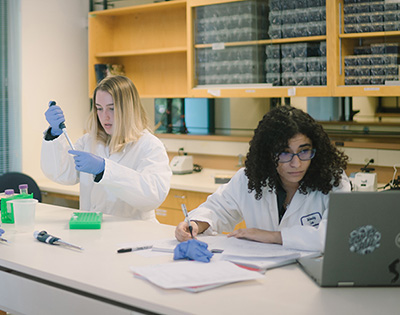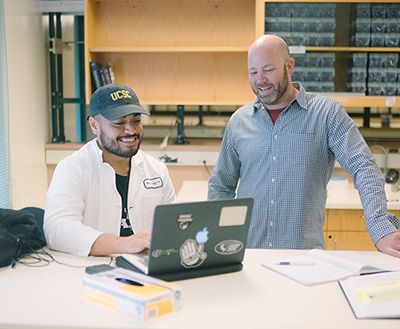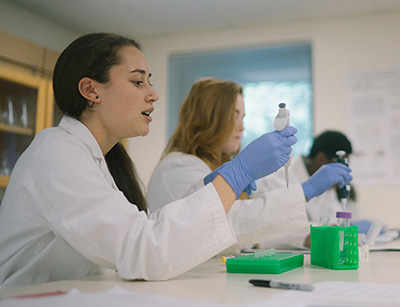Campus News
MCD Biology launches undergraduate biomedical research initiative
Biology professor Jeremy Sanford is taking a bold new approach to the undergraduate biology lab experience.




Biologist Jeremy Sanford wants to greatly expand the opportunities for students to engage in meaningful, hands-on research projects at UC Santa Cruz. Rather than bringing students into faculty research labs, where only a limited number can be accommodated, Sanford is bringing his research program into the laboratory classroom.
Sanford’s Undergraduate Biomedical Research Initiative is a pilot program launched this quarter with 35 students in a new class that provides research experience while fulfilling laboratory course requirements for majors in the Department of Molecular, Cell, and Developmental (MCD) Biology. The students will be working on projects directly connected to Sanford’s research on disease-causing genetic mutations.
“We’re taking them out of the cookbook-style lab classes and putting them in a research lab where they can do hypothesis-driven experiments,” said Sanford, an associate professor of MCD biology. “It’s going to be super cool.”
The benefits for undergraduates of hands-on experience in a faculty research lab are well documented, and UC Santa Cruz has many programs that support undergraduate research. Finding a spot in a lab can be hard, though, especially in departments with large numbers of students. MCD biology, for example, has more than 2,000 students in its majors and only about 25 faculty with active research labs.
“We want to make it easy for all students to get research experience,” said department chair William Saxton, professor of MCD biology. “We have so many students in biology, a lot of classes have hundreds of students in them. It’s important for undergraduates to go beyond the kind of learning they do in those large classes. The research lab is a way to pass on high-level skills and provide the training students need to get a job.”
Crucial funding to get the new lab course off the ground was provided by a gift from UCSC alumnus George Kraw and his wife, Raphael. Sanford first connected with Kraw through their shared enthusiasm for rugby–Sanford serves as a volunteer coach for the men’s rugby team, and Kraw, who played on UCSC’s first team in 1967, donated funds to provide stadium lights for the team’s practices. Their new gift earlier this year included funds for the equipment and materials needed to set up Sanford’s undergraduate research laboratory in the Sinsheimer Laboratories building.
Industry partners could provide ongoing funding to expand and sustain the initiative in the long run, Sanford said. “Funding is always a challenge, and I think the solution is to partner with the biotechnology industry,” he said. “I’m working to build a consortium of companies to provide funding and internships for the students. The companies are interested because competition for talent is fierce and these students will be able to hit the ground running, already trained to think like a scientist and work in a lab.”
Sanford studies proteins that regulate gene expression, the roles such proteins play in cancer, and disease-causing mutations that disrupt their normal activities. The students in his lab class will be working to characterize many of the disease-related mutations that Sanford’s lab has identified in previous research.
“These kids could make some important discoveries, and that’s exciting,” Saxton said. Eventually, he noted, other faculty could set up similar undergraduate research labs based on their own research programs and integrated into the MCD Biology curriculum.
In 2009, with funding from the Howard Hughes Medical Institute, MCD Biology launched a phage genomics course that also provides hands-on research experience. Grant Hartzog, who initially taught the course along with fellow MCD biology professor Manuel Ares, said Sanford’s course is similar in that each student has ownership of their own research problem, but there are also important differences.
“One nice thing is that it’s related to Jeremy’s research, so students can see that they are contributing to a larger research project,” Hartzog said. “Also, he’s designed it so that once it’s up and running there will be students at different levels, so the more experienced students can help those with less experience. And he’s forging connections to the larger Bay Area biotechnology community, which will enrich students’ experiences and perspectives.”
Hartzog cautioned that Sanford may not realize how demanding it is to teach a course like this, but Sanford said he’d rather work harder teaching the lab course than give lectures to classes with 350 students. And Saxton said he’s been impressed by Sanford’s energy and enthusiasm.
“We have the equipment, we have the funding, and we have a guy who’s energetic enough to make it go,” Saxton said. “Jeremy is a real asset for the department and for the campus.”